unit 3 fairness for all 学案-语法(新人教版选修10)
文档属性
| 名称 | unit 3 fairness for all 学案-语法(新人教版选修10) |
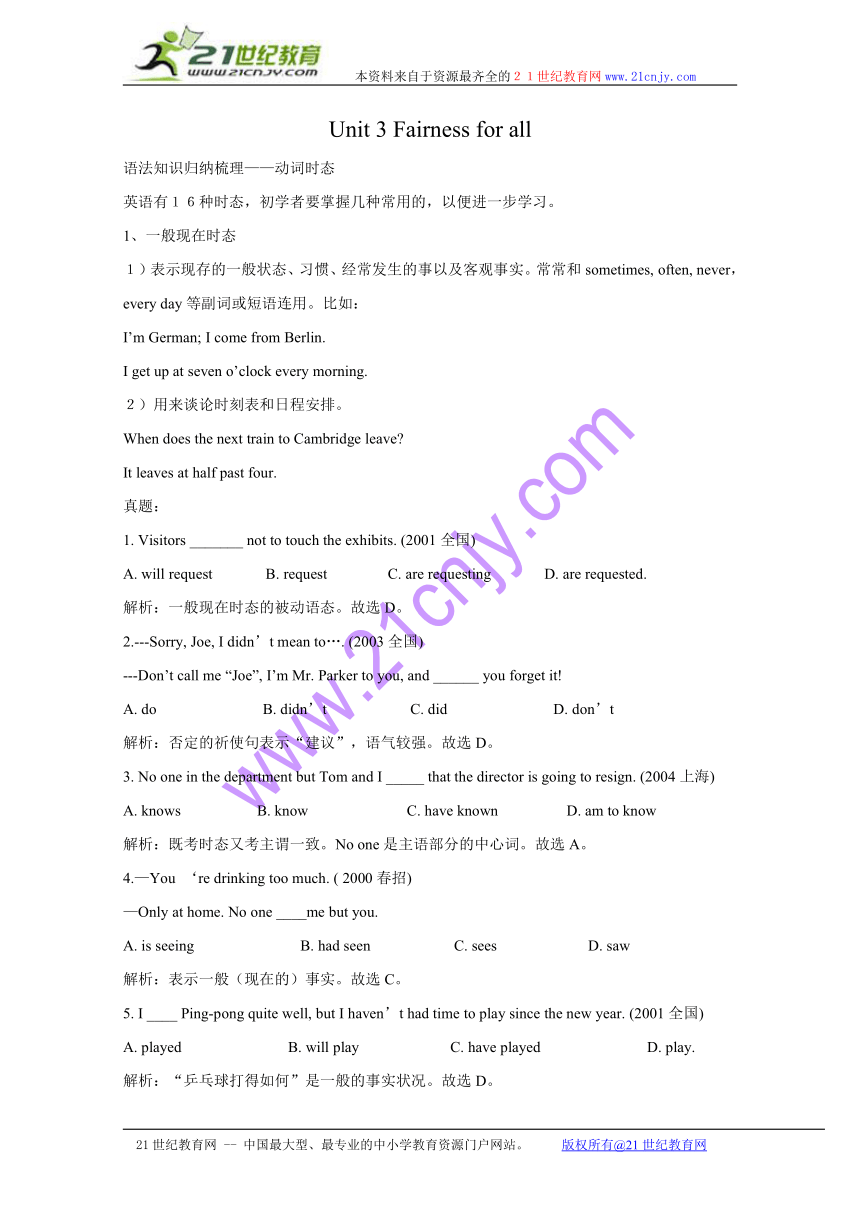
|
|
| 格式 | rar | ||
| 文件大小 | 20.5KB | ||
| 资源类型 | 教案 | ||
| 版本资源 | 人教版(新课程标准) | ||
| 科目 | 英语 | ||
| 更新时间 | 2009-07-07 19:45:00 | ||
图片预览

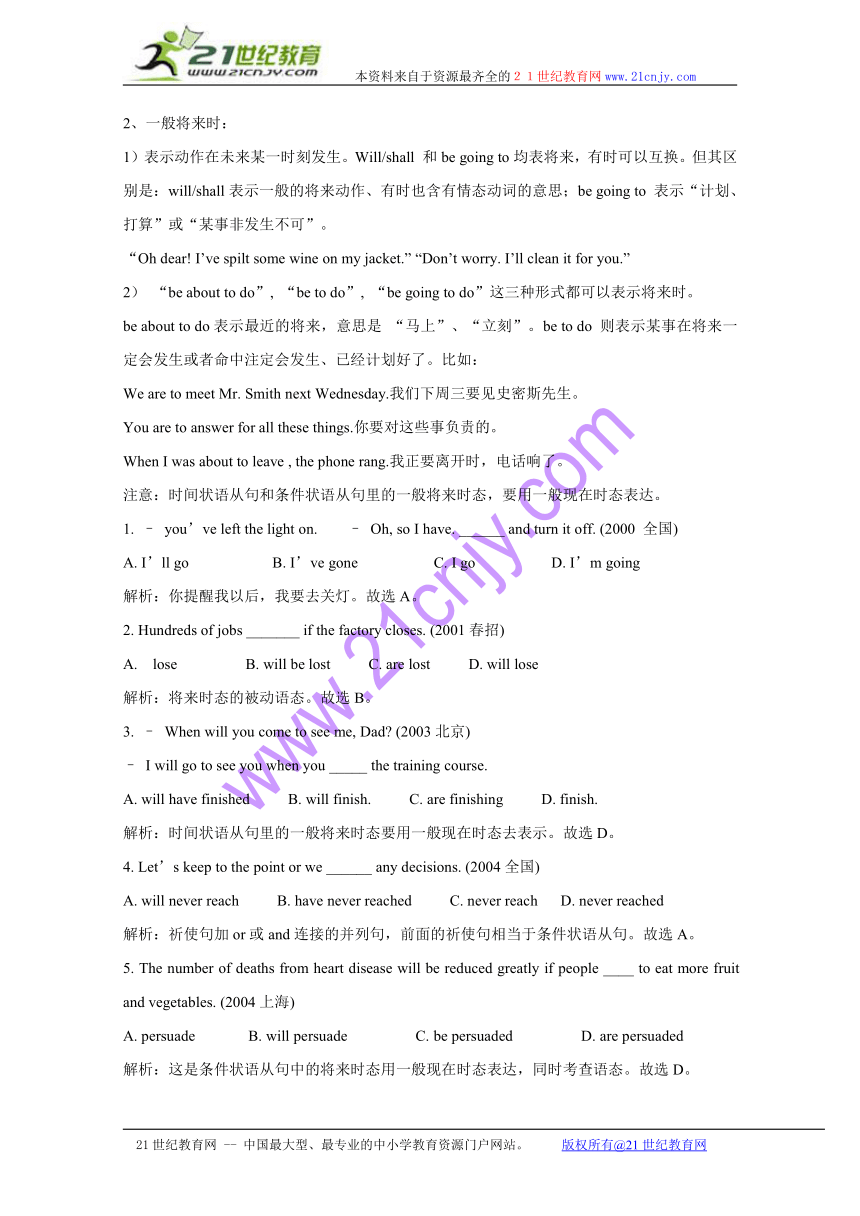
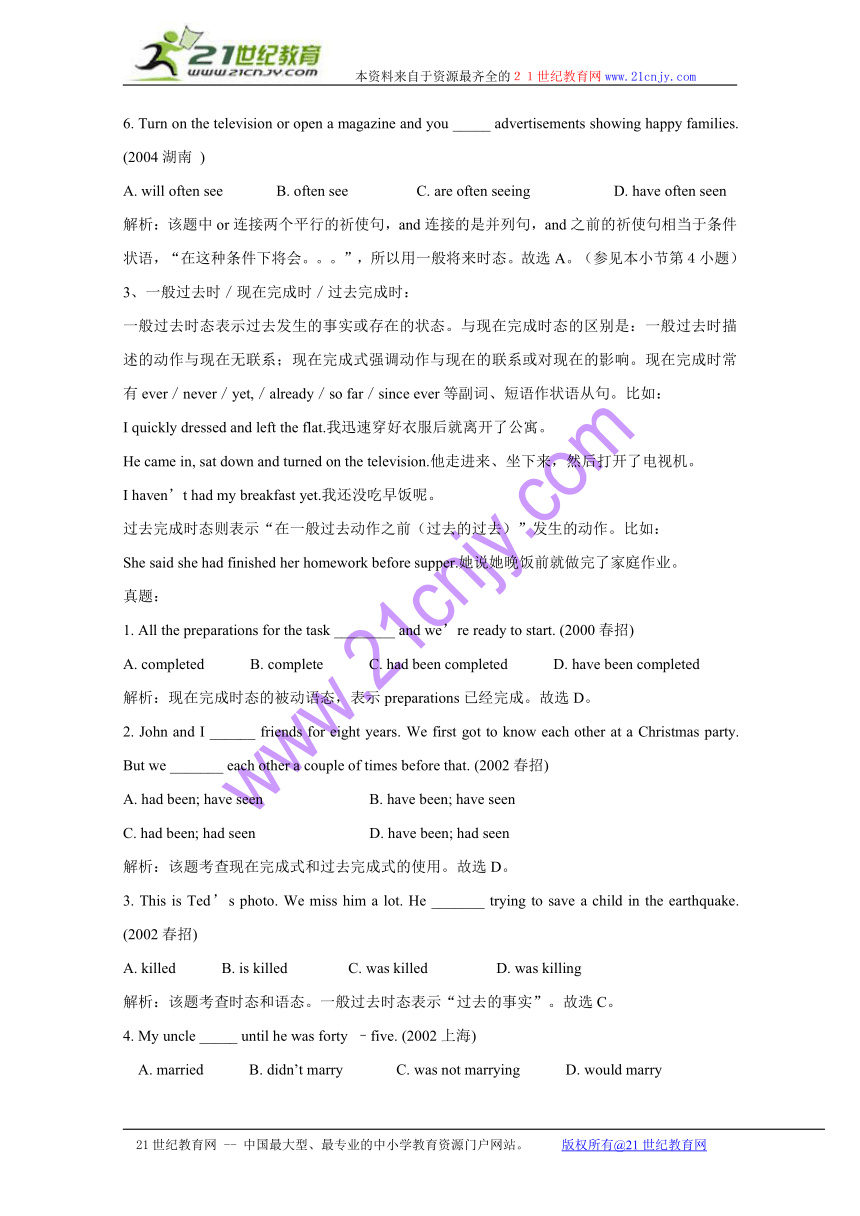
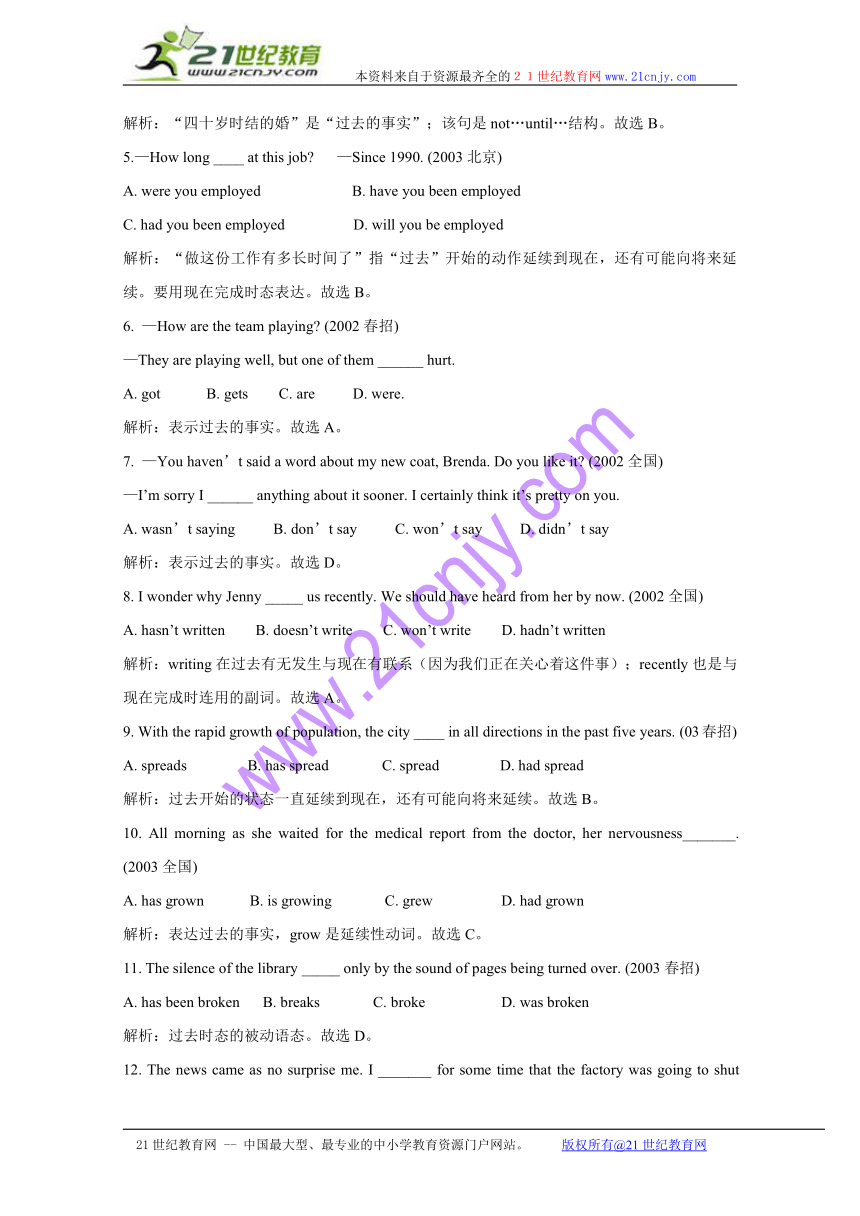
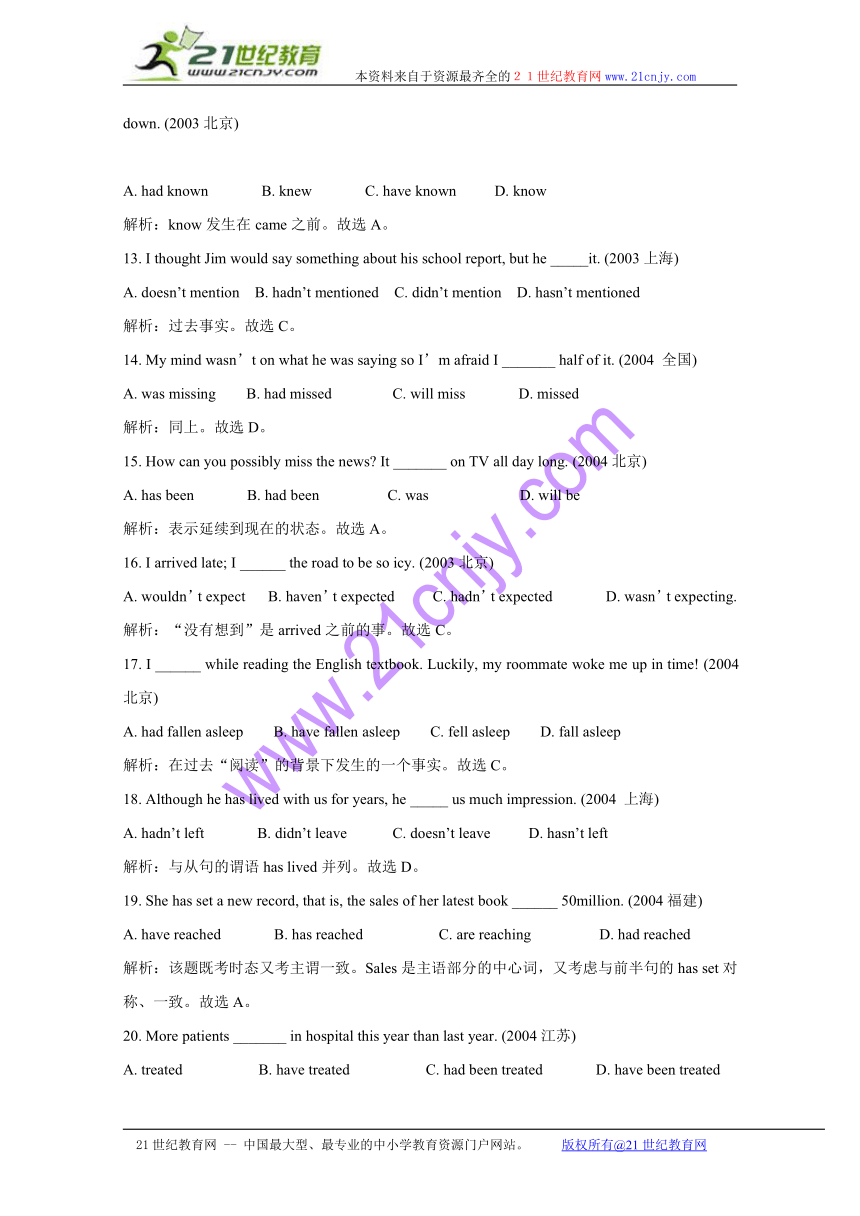
文档简介
本资料来自于资源最齐全的21世纪教育网www.21cnjy.com
Unit 3 Fairness for all
语法知识归纳梳理——动词时态
英语有16种时态,初学者要掌握几种常用的,以便进一步学习。
1、一般现在时态
1)表示现存的一般状态、习惯、经常发生的事以及客观事实。常常和sometimes, often, never,every day等副词或短语连用。比如:
I’m German; I come from Berlin.
I get up at seven o’clock every morning.
2)用来谈论时刻表和日程安排。
When does the next train to Cambridge leave
It leaves at half past four.
真题:
1. Visitors _______ not to touch the exhibits. (2001全国)
A. will request B. request C. are requesting D. are requested.
解析:一般现在时态的被动语态。故选D。
2.---Sorry, Joe, I didn’t mean to…. (2003全国)
---Don’t call me “Joe”, I’m Mr. Parker to you, and ______ you forget it!
A. do B. didn’t C. did D. don’t
解析:否定的祈使句表示“建议”,语气较强。故选D。
3. No one in the department but Tom and I _____ that the director is going to resign. (2004上海)
A. knows B. know C. have known D. am to know
解析:既考时态又考主谓一致。No one是主语部分的中心词。故选A。
4.—You ‘re drinking too much. ( 2000春招)
—Only at home. No one ____me but you.
A. is seeing B. had seen C. sees D. saw
解析:表示一般(现在的)事实。故选C。
5. I ____ Ping-pong quite well, but I haven’t had time to play since the new year. (2001全国)
A. played B. will play C. have played D. play.
解析:“乒乓球打得如何”是一般的事实状况。故选D。
2、一般将来时:
1)表示动作在未来某一时刻发生。Will/shall 和be going to均表将来,有时可以互换。但其区别是:will/shall表示一般的将来动作、有时也含有情态动词的意思;be going to 表示“计划、打算”或“某事非发生不可”。
“Oh dear! I’ve spilt some wine on my jacket.” “Don’t worry. I’ll clean it for you.”
2) “be about to do”, “be to do”, “be going to do”这三种形式都可以表示将来时。
be about to do表示最近的将来,意思是 “马上”、“立刻”。be to do 则表示某事在将来一定会发生或者命中注定会发生、已经计划好了。比如:
We are to meet Mr. Smith next Wednesday.我们下周三要见史密斯先生。
You are to answer for all these things.你要对这些事负责的。
When I was about to leave , the phone rang.我正要离开时,电话响了。
注意:时间状语从句和条件状语从句里的一般将来时态,要用一般现在时态表达。
1. – you’ve left the light on. – Oh, so I have. ______ and turn it off. (2000 全国)
A. I’ll go B. I’ve gone C. I go D. I’m going
解析:你提醒我以后,我要去关灯。故选A。
2. Hundreds of jobs _______ if the factory closes. (2001春招)
A. lose B. will be lost C. are lost D. will lose
解析:将来时态的被动语态。故选B。
3. – When will you come to see me, Dad (2003北京)
– I will go to see you when you _____ the training course.
A. will have finished B. will finish. C. are finishing D. finish.
解析:时间状语从句里的一般将来时态要用一般现在时态去表示。故选D。
4. Let’s keep to the point or we ______ any decisions. (2004全国)
A. will never reach B. have never reached C. never reach D. never reached
解析:祈使句加or或and连接的并列句,前面的祈使句相当于条件状语从句。故选A。
5. The number of deaths from heart disease will be reduced greatly if people ____ to eat more fruit and vegetables. (2004上海)
A. persuade B. will persuade C. be persuaded D. are persuaded
解析:这是条件状语从句中的将来时态用一般现在时态表达,同时考查语态。故选D。
6. Turn on the television or open a magazine and you _____ advertisements showing happy families. (2004湖南 )
A. will often see B. often see C. are often seeing D. have often seen
解析:该题中or连接两个平行的祈使句,and连接的是并列句,and之前的祈使句相当于条件状语,“在这种条件下将会。。。”,所以用一般将来时态。故选A。(参见本小节第4小题)
3、一般过去时/现在完成时/过去完成时:
一般过去时态表示过去发生的事实或存在的状态。与现在完成时态的区别是:一般过去时描述的动作与现在无联系;现在完成式强调动作与现在的联系或对现在的影响。现在完成时常有ever/never/yet,/already/so far/since ever等副词、短语作状语从句。比如:
I quickly dressed and left the flat.我迅速穿好衣服后就离开了公寓。
He came in, sat down and turned on the television.他走进来、坐下来,然后打开了电视机。
I haven’t had my breakfast yet.我还没吃早饭呢。
过去完成时态则表示“在一般过去动作之前(过去的过去)”发生的动作。比如:
She said she had finished her homework before supper.她说她晚饭前就做完了家庭作业。
真题:
1. All the preparations for the task ________ and we’re ready to start. (2000春招)
A. completed B. complete C. had been completed D. have been completed
解析:现在完成时态的被动语态,表示preparations已经完成。故选D。
2. John and I ______ friends for eight years. We first got to know each other at a Christmas party. But we _______ each other a couple of times before that. (2002春招)
A. had been; have seen B. have been; have seen
C. had been; had seen D. have been; had seen
解析:该题考查现在完成式和过去完成式的使用。故选D。
3. This is Ted’s photo. We miss him a lot. He _______ trying to save a child in the earthquake. (2002春招)
A. killed B. is killed C. was killed D. was killing
解析:该题考查时态和语态。一般过去时态表示“过去的事实”。故选C。
4. My uncle _____ until he was forty –five. (2002上海)
A. married B. didn’t marry C. was not marrying D. would marry
解析:“四十岁时结的婚”是“过去的事实”;该句是not…until…结构。故选B。
5.—How long ____ at this job —Since 1990. (2003北京)
A. were you employed B. have you been employed
C. had you been employed D. will you be employed
解析:“做这份工作有多长时间了”指“过去”开始的动作延续到现在,还有可能向将来延续。要用现在完成时态表达。故选B。
6. —How are the team playing (2002春招)
—They are playing well, but one of them ______ hurt.
A. got B. gets C. are D. were.
解析:表示过去的事实。故选A。
7. —You haven’t said a word about my new coat, Brenda. Do you like it (2002全国)
—I’m sorry I ______ anything about it sooner. I certainly think it’s pretty on you.
A. wasn’t saying B. don’t say C. won’t say D. didn’t say
解析:表示过去的事实。故选D。
8. I wonder why Jenny _____ us recently. We should have heard from her by now. (2002全国)
A. hasn’t written B. doesn’t write C. won’t write D. hadn’t written
解析:writing在过去有无发生与现在有联系(因为我们正在关心着这件事);recently也是与现在完成时连用的副词。故选A。
9. With the rapid growth of population, the city ____ in all directions in the past five years. (03春招)
A. spreads B. has spread C. spread D. had spread
解析:过去开始的状态一直延续到现在,还有可能向将来延续。故选B。
10. All morning as she waited for the medical report from the doctor, her nervousness_______. (2003全国)
A. has grown B. is growing C. grew D. had grown
解析:表达过去的事实,grow是延续性动词。故选C。
11. The silence of the library _____ only by the sound of pages being turned over. (2003春招)
A. has been broken B. breaks C. broke D. was broken
解析:过去时态的被动语态。故选D。
12. The news came as no surprise me. I _______ for some time that the factory was going to shut down. (2003北京)
A. had known B. knew C. have known D. know
解析:know发生在came之前。故选A。
13. I thought Jim would say something about his school report, but he _____it. (2003上海)
A. doesn’t mention B. hadn’t mentioned C. didn’t mention D. hasn’t mentioned
解析:过去事实。故选C。
14. My mind wasn’t on what he was saying so I’m afraid I _______ half of it. (2004 全国)
A. was missing B. had missed C. will miss D. missed
解析:同上。故选D。
15. How can you possibly miss the news It _______ on TV all day long. (2004北京)
A. has been B. had been C. was D. will be
解析:表示延续到现在的状态。故选A。
16. I arrived late; I ______ the road to be so icy. (2003北京)
A. wouldn’t expect B. haven’t expected C. hadn’t expected D. wasn’t expecting.
解析:“没有想到”是arrived之前的事。故选C。
17. I ______ while reading the English textbook. Luckily, my roommate woke me up in time! (2004北京)
A. had fallen asleep B. have fallen asleep C. fell asleep D. fall asleep
解析:在过去“阅读”的背景下发生的一个事实。故选C。
18. Although he has lived with us for years, he _____ us much impression. (2004 上海)
A. hadn’t left B. didn’t leave C. doesn’t leave D. hasn’t left
解析:与从句的谓语has lived并列。故选D。
19. She has set a new record, that is, the sales of her latest book ______ 50million. (2004福建)
A. have reached B. has reached C. are reaching D. had reached
解析:该题既考时态又考主谓一致。Sales是主语部分的中心词,又考虑与前半句的has set对称、一致。故选A。
20. More patients _______ in hospital this year than last year. (2004江苏)
A. treated B. have treated C. had been treated D. have been treated
解析:现在完成时态的被动语态。故选D。
21. The first use of atomic weapons was in 1945, and their power _____ increased enormously ever since. (2004上海)
A. is B. was C. has been D. had been
解析:ever since也是现在完成时态的标志。故选C。
22. She ______ her hairstyle in her hometown before she came to Chongqing for a better job. (2004重庆)
A. would change B. has changed C. changed D. was changing
解析:该题中change发生在came前。但是没有过去完成时态had changed供选择,故只有选C。语法规定:当不强调某一动作发生在过去某动作之前、或读者一读到就明白哪个动作发生在前,可以用一般过去时态代替过去完成时态。
23. Sales of CDs have greatly increased since the early 1990s, when people _____ to enjoy the advantages of this new technology. (2004江苏)
A. begin B. began C. have begun D. had begun
解析:时间状语从句描述的还是过去的事实。故选B。
24. It is said in the book that Thomas Edison (1847—1931) _____ the world leading inventor for sixty years. (2004辽宁)
A. would be B. has been C. had been D. was
解析:表示过去的状态。故选D。
25. He kept looking at her, wondering whether he ______ her somewhere. (2004湖北)
A. saw B. has been C. sees D. had seen
解析:see应该发生在kept looking之前。故选D。
26. –George and Lucy got married last week. Did you go to their wedding (2004湖北)
–No, I ________. Did they have a big wedding
A. was not invited B. have not been invited C. hadn’t been invited D. didn’t invite
解析:在did go to their wedding之前没有得到邀请。故选C。
27. —I hear Jane has gone to the Holy Island for her holiday. (2004湖南)
—Oh, how nice! Do you know when she______
A. was leaving B. had left C. has left D. left
解析:问“离开”发生在过去什么时候,是一般过去的事实。故选D。
28. —The window is dirty. —I know. It _______for weeks. (2004广西)
A. hasn’t cleaned B. didn’t clean C. wasn’t cleaned D. hasn’t been cleaned
解析:表示从过去延续到现在的状态,有是“被动”。故选D。
29. —How are you today (2000全国)
—Oh, I ______as ill as I do now for a very long time.
A. didn’t feel B. wasn’t feeling C. don’t feel D. haven’t felt.
解析:谈过去的感受与现在的联系。故选D。
30. I _____ you not to move my dictionary; now I can’t find it. (2004吉林)
A. asked B. ask C. was asking D. had asked
解析:该句表示过去的事实。故选A。
4. 过去将来时: 表示从过去某一时刻看那以后将要发生的动作或存在的状态。由 “would+动词原形”构成。The weather report said there would be strong winds.
辨析:强调今昔对比用used to do;would do表达过去反复发生的动作,“过去经常”。比如:
As soon as she got up in the morning, she would make herself a cup of tea.
Charles would always smoke his pipe after dinner.
When I was in Australia, she would come to see us on weekends.
Now and then he would sit under the tree reading.
真题:—What were you doing when Tony phoned you (2004天津)
—I had just finished my work and _____ to take a shower.
A. had started B. started C. have started D. was starting
解析:“我”在Tony给我电话时就完成了(had finished)作业,正准备要去冲凉,所以是过去将来。备选答案中只有was starting(过去进行时态)表示过去将来。故选D。
5. 现在进行时:
a) 表达目前正发生或存在的短暂性的动作或状态。比如:
Someone is walking towards the house.
Bob and I are having golf lessons.
2) 少数表示动态动作的动词现在进行时态,可表示将来的计划,即最近的将来要进行的事。(常见的有go, come, stay, arrive, leave, start, fly, stop, take等)比如:
I am going up to London, can’t you see
I am taking my mum to holiday in Florida this summer.
3)现在进行时如与always, forever, often搭配表示讲话时强烈的感彩, 表示赞扬或责备的语气。比如:
Tom is doing everything well.
John is always chatting in class.
注意:时间状语从句和条件状语从句里的过去将来时态要用一般过去时态表达。
真题:
1. Selecting a mobile phone for personal use is no easy task because technology _______ so rapidly. ( 2001全国)
A. is changing B. has changed C. will have changed D. will change
解析:技术飞速的发展是目前正存在的状态。故选A。
2. A new cinema _________ here. They hope to finish it next month. (2001春招)
A. will be built B. is built C. has been built D. is being built
解析:该电影院“正在被建设”之中。故选D。
3. I’ve won a holiday for two days to Florida. I ________ my mum. (2001春招)
A. am taking B. have taken C. take D. will have taken
解析:表示“近期的计划打算”,故选A。
4. —What’s that terrible noise (2004北京)
—The neighbors ________ for party.
A. have prepared B. are preparing C. prepare D. will prepare
解析:此对话谈论的是正在发生的事。故选B。
5. Because the shop _____ , all the T-shirts are sold at half price. (2004浙江)
A. has closed down B. closed down C. is closing down had closed down
解析:“工厂正处于倒闭的过程中,还没有完全倒闭”,进行时态表示现存的状态。故选C。
6. 过去进行时:
1)常用于背景叙述。表示过去一段时间内一直发生着的动作或状态。比如:
It was raining hard and the traffic was creeping along the high street.
2)过去进行时也可以用以描述某事发生时正在进行的动作或情景。
I was working in the garden when there was a stampede.当发生畜群惊跑时,我正在园里劳动。
He was working as a teacher when he first met Julia Marsh.
真题:
1. The reporter said that the UFO _____ east to west when he saw it. (2000全国)
A. was traveling. B. traveled C. had been traveling D. was to travel.
解析:过去the reporter看着的时候正发生的事。故选A。
2. —Sorry to have interrupted you. Please go on. (2004北京)
—Where was I
—You ______ you didn’t like your father’s job.
A. had said B. said C. were saying D. had been saying
解析:此对话问“你刚才说的”,所以要用过去进行时态。故选C。
3. —You were out when I dropped in at your house. (2004福建)
—Oh, I ______ for a friend from England at the airport.
A. was waiting B. had waited C. am waiting D. have waited
解析:过去dropped in发生的时候,wait正发生或存在着。故选A。
4. —Has Sam finished his homework today (2004吉林)
—I have no idea. He ______ it this morning.
A. did B. has done C. was doing D. had done
解析:在过去一段时间内一直发生或存在的动作或状态用过去进行时态表示。故选C。
7. 将来进行时 其构成是:will/shall+ be + 现在分词(动词的-ing形式)
1)用以预测一种会在未来某一段时间里出现的延续性动作或情景。比如:
This time next week I’ll be lying on a Miami beach.
Next time you see me I won’t be wearing glasses.
请注意将来进行时的疑问形式和否定形式:
What will you be wearing
Will you be wearing trousers
Won’t you be wearing a skirt
I won’t be wearing jeans.
2)将来进行时常用以表示在将来某事发生时,另一动作正在进行过程之中。
If you need me, I’ll be waiting by the telephone.
When you see me again, I’ll be living in my new flat.
真题:At this time tomorrow ______ over the Atlantic. (2003北京)
A. we’re going to fly B. we’ll be flying C. we’ll fly D. we’re to fly
解析:明天的此刻是将来时间,在将来某一时刻或某一动作发生的时候,另一动作或状态正发生或存在着,用将来进行时态。故选B。
注意:高考中还会考查:现在完成进行时态、过去完成进行时态、将来完成时态等。请看:真题:
8. 将来完成时态
The mayor of Beijing says that all construction work for the Beijing Olympics ____ by 2006. (2004北京)
A. has been completed B. has completed
C. will have been completed D. will have completed
解析:在将来某时或某动作发生的时刻,另一动作已完成,用将来完成时态表示。故选C。
9. 现在完成进行时态
Now that she is out of a job, Lucy ____ going back to school, but she hasn’t decided yet. (04北京)
A. had considered B. has been considering C. considered D. is going to consider
解析:她一直在考虑,“从过去一直延续到现在”,强调“一直不间断”。故选B。
10. 过去完成进行时态
The crazy fans _____ patiently for two hours, and they would wait till the movie star arrived. (2004重庆)
A. were waiting B. had been waiting C. had waited D. would wait
解析:动作wait在arrived实现之前一直存在着,所以要用过去完成进行时态。故选B。
21世纪教育网 -- 中国最大型、最专业的中小学教育资源门户网站。 版权所有@21世纪教育网
Unit 3 Fairness for all
语法知识归纳梳理——动词时态
英语有16种时态,初学者要掌握几种常用的,以便进一步学习。
1、一般现在时态
1)表示现存的一般状态、习惯、经常发生的事以及客观事实。常常和sometimes, often, never,every day等副词或短语连用。比如:
I’m German; I come from Berlin.
I get up at seven o’clock every morning.
2)用来谈论时刻表和日程安排。
When does the next train to Cambridge leave
It leaves at half past four.
真题:
1. Visitors _______ not to touch the exhibits. (2001全国)
A. will request B. request C. are requesting D. are requested.
解析:一般现在时态的被动语态。故选D。
2.---Sorry, Joe, I didn’t mean to…. (2003全国)
---Don’t call me “Joe”, I’m Mr. Parker to you, and ______ you forget it!
A. do B. didn’t C. did D. don’t
解析:否定的祈使句表示“建议”,语气较强。故选D。
3. No one in the department but Tom and I _____ that the director is going to resign. (2004上海)
A. knows B. know C. have known D. am to know
解析:既考时态又考主谓一致。No one是主语部分的中心词。故选A。
4.—You ‘re drinking too much. ( 2000春招)
—Only at home. No one ____me but you.
A. is seeing B. had seen C. sees D. saw
解析:表示一般(现在的)事实。故选C。
5. I ____ Ping-pong quite well, but I haven’t had time to play since the new year. (2001全国)
A. played B. will play C. have played D. play.
解析:“乒乓球打得如何”是一般的事实状况。故选D。
2、一般将来时:
1)表示动作在未来某一时刻发生。Will/shall 和be going to均表将来,有时可以互换。但其区别是:will/shall表示一般的将来动作、有时也含有情态动词的意思;be going to 表示“计划、打算”或“某事非发生不可”。
“Oh dear! I’ve spilt some wine on my jacket.” “Don’t worry. I’ll clean it for you.”
2) “be about to do”, “be to do”, “be going to do”这三种形式都可以表示将来时。
be about to do表示最近的将来,意思是 “马上”、“立刻”。be to do 则表示某事在将来一定会发生或者命中注定会发生、已经计划好了。比如:
We are to meet Mr. Smith next Wednesday.我们下周三要见史密斯先生。
You are to answer for all these things.你要对这些事负责的。
When I was about to leave , the phone rang.我正要离开时,电话响了。
注意:时间状语从句和条件状语从句里的一般将来时态,要用一般现在时态表达。
1. – you’ve left the light on. – Oh, so I have. ______ and turn it off. (2000 全国)
A. I’ll go B. I’ve gone C. I go D. I’m going
解析:你提醒我以后,我要去关灯。故选A。
2. Hundreds of jobs _______ if the factory closes. (2001春招)
A. lose B. will be lost C. are lost D. will lose
解析:将来时态的被动语态。故选B。
3. – When will you come to see me, Dad (2003北京)
– I will go to see you when you _____ the training course.
A. will have finished B. will finish. C. are finishing D. finish.
解析:时间状语从句里的一般将来时态要用一般现在时态去表示。故选D。
4. Let’s keep to the point or we ______ any decisions. (2004全国)
A. will never reach B. have never reached C. never reach D. never reached
解析:祈使句加or或and连接的并列句,前面的祈使句相当于条件状语从句。故选A。
5. The number of deaths from heart disease will be reduced greatly if people ____ to eat more fruit and vegetables. (2004上海)
A. persuade B. will persuade C. be persuaded D. are persuaded
解析:这是条件状语从句中的将来时态用一般现在时态表达,同时考查语态。故选D。
6. Turn on the television or open a magazine and you _____ advertisements showing happy families. (2004湖南 )
A. will often see B. often see C. are often seeing D. have often seen
解析:该题中or连接两个平行的祈使句,and连接的是并列句,and之前的祈使句相当于条件状语,“在这种条件下将会。。。”,所以用一般将来时态。故选A。(参见本小节第4小题)
3、一般过去时/现在完成时/过去完成时:
一般过去时态表示过去发生的事实或存在的状态。与现在完成时态的区别是:一般过去时描述的动作与现在无联系;现在完成式强调动作与现在的联系或对现在的影响。现在完成时常有ever/never/yet,/already/so far/since ever等副词、短语作状语从句。比如:
I quickly dressed and left the flat.我迅速穿好衣服后就离开了公寓。
He came in, sat down and turned on the television.他走进来、坐下来,然后打开了电视机。
I haven’t had my breakfast yet.我还没吃早饭呢。
过去完成时态则表示“在一般过去动作之前(过去的过去)”发生的动作。比如:
She said she had finished her homework before supper.她说她晚饭前就做完了家庭作业。
真题:
1. All the preparations for the task ________ and we’re ready to start. (2000春招)
A. completed B. complete C. had been completed D. have been completed
解析:现在完成时态的被动语态,表示preparations已经完成。故选D。
2. John and I ______ friends for eight years. We first got to know each other at a Christmas party. But we _______ each other a couple of times before that. (2002春招)
A. had been; have seen B. have been; have seen
C. had been; had seen D. have been; had seen
解析:该题考查现在完成式和过去完成式的使用。故选D。
3. This is Ted’s photo. We miss him a lot. He _______ trying to save a child in the earthquake. (2002春招)
A. killed B. is killed C. was killed D. was killing
解析:该题考查时态和语态。一般过去时态表示“过去的事实”。故选C。
4. My uncle _____ until he was forty –five. (2002上海)
A. married B. didn’t marry C. was not marrying D. would marry
解析:“四十岁时结的婚”是“过去的事实”;该句是not…until…结构。故选B。
5.—How long ____ at this job —Since 1990. (2003北京)
A. were you employed B. have you been employed
C. had you been employed D. will you be employed
解析:“做这份工作有多长时间了”指“过去”开始的动作延续到现在,还有可能向将来延续。要用现在完成时态表达。故选B。
6. —How are the team playing (2002春招)
—They are playing well, but one of them ______ hurt.
A. got B. gets C. are D. were.
解析:表示过去的事实。故选A。
7. —You haven’t said a word about my new coat, Brenda. Do you like it (2002全国)
—I’m sorry I ______ anything about it sooner. I certainly think it’s pretty on you.
A. wasn’t saying B. don’t say C. won’t say D. didn’t say
解析:表示过去的事实。故选D。
8. I wonder why Jenny _____ us recently. We should have heard from her by now. (2002全国)
A. hasn’t written B. doesn’t write C. won’t write D. hadn’t written
解析:writing在过去有无发生与现在有联系(因为我们正在关心着这件事);recently也是与现在完成时连用的副词。故选A。
9. With the rapid growth of population, the city ____ in all directions in the past five years. (03春招)
A. spreads B. has spread C. spread D. had spread
解析:过去开始的状态一直延续到现在,还有可能向将来延续。故选B。
10. All morning as she waited for the medical report from the doctor, her nervousness_______. (2003全国)
A. has grown B. is growing C. grew D. had grown
解析:表达过去的事实,grow是延续性动词。故选C。
11. The silence of the library _____ only by the sound of pages being turned over. (2003春招)
A. has been broken B. breaks C. broke D. was broken
解析:过去时态的被动语态。故选D。
12. The news came as no surprise me. I _______ for some time that the factory was going to shut down. (2003北京)
A. had known B. knew C. have known D. know
解析:know发生在came之前。故选A。
13. I thought Jim would say something about his school report, but he _____it. (2003上海)
A. doesn’t mention B. hadn’t mentioned C. didn’t mention D. hasn’t mentioned
解析:过去事实。故选C。
14. My mind wasn’t on what he was saying so I’m afraid I _______ half of it. (2004 全国)
A. was missing B. had missed C. will miss D. missed
解析:同上。故选D。
15. How can you possibly miss the news It _______ on TV all day long. (2004北京)
A. has been B. had been C. was D. will be
解析:表示延续到现在的状态。故选A。
16. I arrived late; I ______ the road to be so icy. (2003北京)
A. wouldn’t expect B. haven’t expected C. hadn’t expected D. wasn’t expecting.
解析:“没有想到”是arrived之前的事。故选C。
17. I ______ while reading the English textbook. Luckily, my roommate woke me up in time! (2004北京)
A. had fallen asleep B. have fallen asleep C. fell asleep D. fall asleep
解析:在过去“阅读”的背景下发生的一个事实。故选C。
18. Although he has lived with us for years, he _____ us much impression. (2004 上海)
A. hadn’t left B. didn’t leave C. doesn’t leave D. hasn’t left
解析:与从句的谓语has lived并列。故选D。
19. She has set a new record, that is, the sales of her latest book ______ 50million. (2004福建)
A. have reached B. has reached C. are reaching D. had reached
解析:该题既考时态又考主谓一致。Sales是主语部分的中心词,又考虑与前半句的has set对称、一致。故选A。
20. More patients _______ in hospital this year than last year. (2004江苏)
A. treated B. have treated C. had been treated D. have been treated
解析:现在完成时态的被动语态。故选D。
21. The first use of atomic weapons was in 1945, and their power _____ increased enormously ever since. (2004上海)
A. is B. was C. has been D. had been
解析:ever since也是现在完成时态的标志。故选C。
22. She ______ her hairstyle in her hometown before she came to Chongqing for a better job. (2004重庆)
A. would change B. has changed C. changed D. was changing
解析:该题中change发生在came前。但是没有过去完成时态had changed供选择,故只有选C。语法规定:当不强调某一动作发生在过去某动作之前、或读者一读到就明白哪个动作发生在前,可以用一般过去时态代替过去完成时态。
23. Sales of CDs have greatly increased since the early 1990s, when people _____ to enjoy the advantages of this new technology. (2004江苏)
A. begin B. began C. have begun D. had begun
解析:时间状语从句描述的还是过去的事实。故选B。
24. It is said in the book that Thomas Edison (1847—1931) _____ the world leading inventor for sixty years. (2004辽宁)
A. would be B. has been C. had been D. was
解析:表示过去的状态。故选D。
25. He kept looking at her, wondering whether he ______ her somewhere. (2004湖北)
A. saw B. has been C. sees D. had seen
解析:see应该发生在kept looking之前。故选D。
26. –George and Lucy got married last week. Did you go to their wedding (2004湖北)
–No, I ________. Did they have a big wedding
A. was not invited B. have not been invited C. hadn’t been invited D. didn’t invite
解析:在did go to their wedding之前没有得到邀请。故选C。
27. —I hear Jane has gone to the Holy Island for her holiday. (2004湖南)
—Oh, how nice! Do you know when she______
A. was leaving B. had left C. has left D. left
解析:问“离开”发生在过去什么时候,是一般过去的事实。故选D。
28. —The window is dirty. —I know. It _______for weeks. (2004广西)
A. hasn’t cleaned B. didn’t clean C. wasn’t cleaned D. hasn’t been cleaned
解析:表示从过去延续到现在的状态,有是“被动”。故选D。
29. —How are you today (2000全国)
—Oh, I ______as ill as I do now for a very long time.
A. didn’t feel B. wasn’t feeling C. don’t feel D. haven’t felt.
解析:谈过去的感受与现在的联系。故选D。
30. I _____ you not to move my dictionary; now I can’t find it. (2004吉林)
A. asked B. ask C. was asking D. had asked
解析:该句表示过去的事实。故选A。
4. 过去将来时: 表示从过去某一时刻看那以后将要发生的动作或存在的状态。由 “would+动词原形”构成。The weather report said there would be strong winds.
辨析:强调今昔对比用used to do;would do表达过去反复发生的动作,“过去经常”。比如:
As soon as she got up in the morning, she would make herself a cup of tea.
Charles would always smoke his pipe after dinner.
When I was in Australia, she would come to see us on weekends.
Now and then he would sit under the tree reading.
真题:—What were you doing when Tony phoned you (2004天津)
—I had just finished my work and _____ to take a shower.
A. had started B. started C. have started D. was starting
解析:“我”在Tony给我电话时就完成了(had finished)作业,正准备要去冲凉,所以是过去将来。备选答案中只有was starting(过去进行时态)表示过去将来。故选D。
5. 现在进行时:
a) 表达目前正发生或存在的短暂性的动作或状态。比如:
Someone is walking towards the house.
Bob and I are having golf lessons.
2) 少数表示动态动作的动词现在进行时态,可表示将来的计划,即最近的将来要进行的事。(常见的有go, come, stay, arrive, leave, start, fly, stop, take等)比如:
I am going up to London, can’t you see
I am taking my mum to holiday in Florida this summer.
3)现在进行时如与always, forever, often搭配表示讲话时强烈的感彩, 表示赞扬或责备的语气。比如:
Tom is doing everything well.
John is always chatting in class.
注意:时间状语从句和条件状语从句里的过去将来时态要用一般过去时态表达。
真题:
1. Selecting a mobile phone for personal use is no easy task because technology _______ so rapidly. ( 2001全国)
A. is changing B. has changed C. will have changed D. will change
解析:技术飞速的发展是目前正存在的状态。故选A。
2. A new cinema _________ here. They hope to finish it next month. (2001春招)
A. will be built B. is built C. has been built D. is being built
解析:该电影院“正在被建设”之中。故选D。
3. I’ve won a holiday for two days to Florida. I ________ my mum. (2001春招)
A. am taking B. have taken C. take D. will have taken
解析:表示“近期的计划打算”,故选A。
4. —What’s that terrible noise (2004北京)
—The neighbors ________ for party.
A. have prepared B. are preparing C. prepare D. will prepare
解析:此对话谈论的是正在发生的事。故选B。
5. Because the shop _____ , all the T-shirts are sold at half price. (2004浙江)
A. has closed down B. closed down C. is closing down had closed down
解析:“工厂正处于倒闭的过程中,还没有完全倒闭”,进行时态表示现存的状态。故选C。
6. 过去进行时:
1)常用于背景叙述。表示过去一段时间内一直发生着的动作或状态。比如:
It was raining hard and the traffic was creeping along the high street.
2)过去进行时也可以用以描述某事发生时正在进行的动作或情景。
I was working in the garden when there was a stampede.当发生畜群惊跑时,我正在园里劳动。
He was working as a teacher when he first met Julia Marsh.
真题:
1. The reporter said that the UFO _____ east to west when he saw it. (2000全国)
A. was traveling. B. traveled C. had been traveling D. was to travel.
解析:过去the reporter看着的时候正发生的事。故选A。
2. —Sorry to have interrupted you. Please go on. (2004北京)
—Where was I
—You ______ you didn’t like your father’s job.
A. had said B. said C. were saying D. had been saying
解析:此对话问“你刚才说的”,所以要用过去进行时态。故选C。
3. —You were out when I dropped in at your house. (2004福建)
—Oh, I ______ for a friend from England at the airport.
A. was waiting B. had waited C. am waiting D. have waited
解析:过去dropped in发生的时候,wait正发生或存在着。故选A。
4. —Has Sam finished his homework today (2004吉林)
—I have no idea. He ______ it this morning.
A. did B. has done C. was doing D. had done
解析:在过去一段时间内一直发生或存在的动作或状态用过去进行时态表示。故选C。
7. 将来进行时 其构成是:will/shall+ be + 现在分词(动词的-ing形式)
1)用以预测一种会在未来某一段时间里出现的延续性动作或情景。比如:
This time next week I’ll be lying on a Miami beach.
Next time you see me I won’t be wearing glasses.
请注意将来进行时的疑问形式和否定形式:
What will you be wearing
Will you be wearing trousers
Won’t you be wearing a skirt
I won’t be wearing jeans.
2)将来进行时常用以表示在将来某事发生时,另一动作正在进行过程之中。
If you need me, I’ll be waiting by the telephone.
When you see me again, I’ll be living in my new flat.
真题:At this time tomorrow ______ over the Atlantic. (2003北京)
A. we’re going to fly B. we’ll be flying C. we’ll fly D. we’re to fly
解析:明天的此刻是将来时间,在将来某一时刻或某一动作发生的时候,另一动作或状态正发生或存在着,用将来进行时态。故选B。
注意:高考中还会考查:现在完成进行时态、过去完成进行时态、将来完成时态等。请看:真题:
8. 将来完成时态
The mayor of Beijing says that all construction work for the Beijing Olympics ____ by 2006. (2004北京)
A. has been completed B. has completed
C. will have been completed D. will have completed
解析:在将来某时或某动作发生的时刻,另一动作已完成,用将来完成时态表示。故选C。
9. 现在完成进行时态
Now that she is out of a job, Lucy ____ going back to school, but she hasn’t decided yet. (04北京)
A. had considered B. has been considering C. considered D. is going to consider
解析:她一直在考虑,“从过去一直延续到现在”,强调“一直不间断”。故选B。
10. 过去完成进行时态
The crazy fans _____ patiently for two hours, and they would wait till the movie star arrived. (2004重庆)
A. were waiting B. had been waiting C. had waited D. would wait
解析:动作wait在arrived实现之前一直存在着,所以要用过去完成进行时态。故选B。
21世纪教育网 -- 中国最大型、最专业的中小学教育资源门户网站。 版权所有@21世纪教育网
